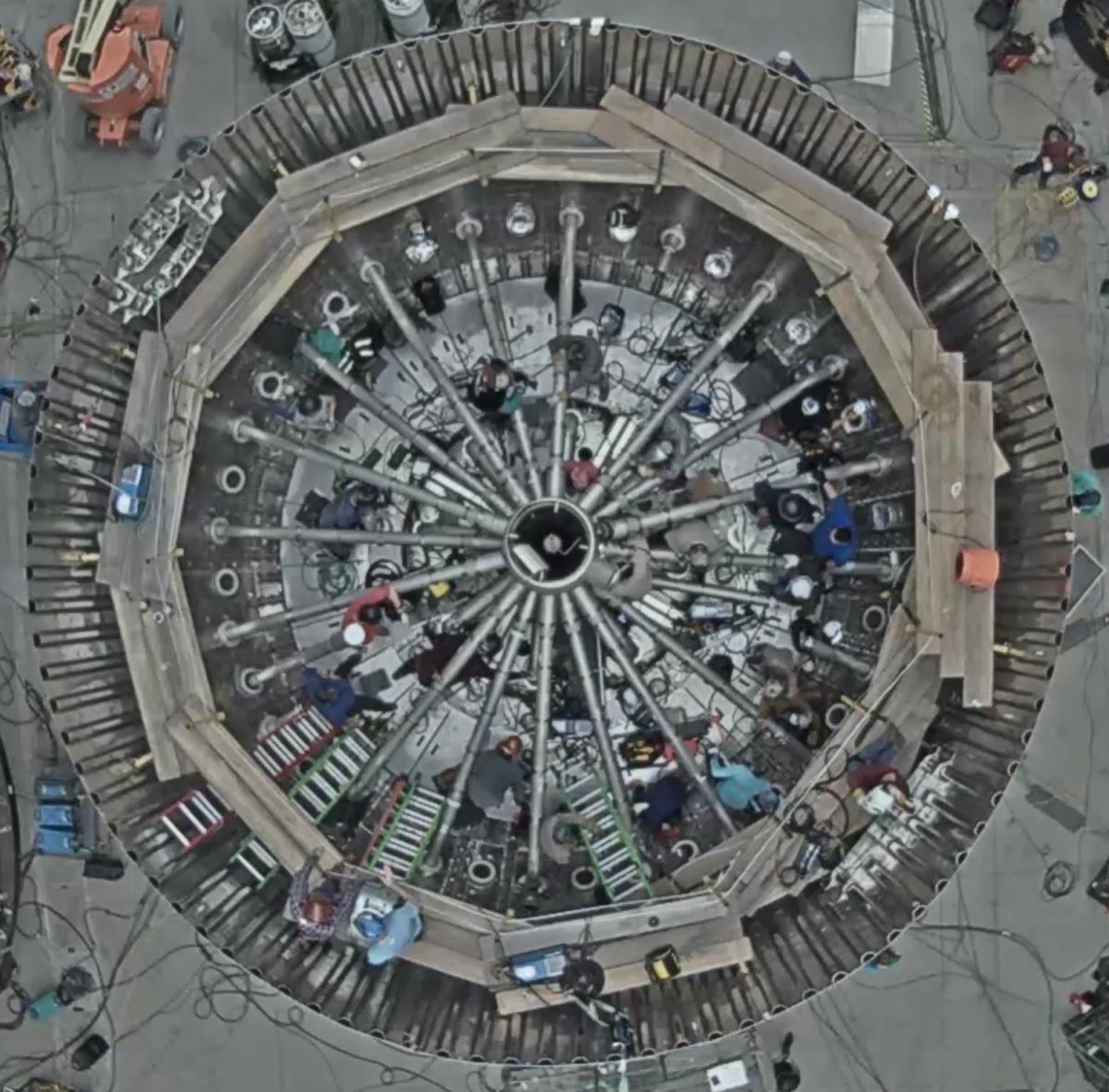Apollo 15 Commander David Scott drives the lunar roving vehicle on the surface of the Moon, the first time the rover was used.
Read MoreMonth: July 2021
Elon Musk shows off wild plumbing for 29-engine Super Heavy booster (photo)
SpaceX’s Super Heavy booster is a complicated beast. On Thursday (July 29), SpaceX chief Elon Musk gave us an inside look at the engine section of a Super Heavy that’s coming together at the company’s South Texas site, near the Gulf Coast village of Boca Chica. There is a lot of plumbing involved. Related: SpaceX’s Starship and Super Heavy rocket in pictures Completing feed system for 29 Raptor rocket engines on Super Heavy Booster pic.twitter.com/uARWx2HYTrJuly 29, 2021 See more “Completing feed system for 29 Raptor rocket engines on Super Heavy…
Read MoreWhy does the Milky Way have spiral arms? New Gaia data are helping solve the puzzle
New data from the star-mapping Gaia satellite are helping scientists unlock the mystery of our Milky Way galaxy’s spiral arms. Recently published studies exploring the Early Data Release 3 (EDR3), a batch of observations made available to the scientific community last December, reveal the spiral structure of our galaxy with a greater precision and detail than was possible before. Since the 1950s, astronomers have known that our galaxy, the Milky Way, looks like a spiral, with several dense streams of stars and dust emanating from the galactic center, winding through…
Read MoreThese 10 super extreme exoplanets are out of this world
It’s almost hard to believe that until the early years of the 1990s, astronomers had yet to discover a planet outside the solar system. Even though scientists were certain that other stars orbited other stars, there was little evidence of other planetary systems until the discovery of two extrasolar planets — or exoplanets — orbiting the pulsar PSR 1257+12 in 1992 by Aleksander Wolszczan and Dale Frail, as logged in the journal Nature. This initial discovery was soon followed by the observation of 51 Pegasi b — the first exoplanet…
Read MoreThis Week’s Sky at a Glance, July 30 – August 7
Saturn is at opposition this week, and Jupiter is soon to follow. Will your scope show the Seeliger effect of Saturn’s opposition rings? Venus continues to haunt the low west in twilight. And in the south, Sagittarius starts nudging Scorpius aside. The post This Week's Sky at a Glance, July 30 – August 7 appeared first on Sky & Telescope.
Read MoreNASA’s 10th Space Apps Challenge Increases Global Participation
To mark the 10th International Space Apps Challenge, the largest annual global hackathon in the world, NASA is collaborating with nine space agency partners to bring the event to even more communities Oct. 2-3, 2021.
Read MoreNASA Invites Media to International Space Station Update
NASA will host a media teleconference at 4:30 p.m. EDT today, Thursday, July 29, to discuss the status of International Space Station activities.
Read MoreStaring at the Sun
On April 29, 2015, NuSTAR, Hinode, and SDO all stared at our Sun.
Read MoreBoeing’s Starliner OFT-2 mission to the International Space Station: When to watch and what to know
Boeing’s Starliner astronaut taxi is about to do a key test of its systems ahead of carrying humans. On Friday (July 30), the spacecraft will launch on an uncrewed mission and attempt to reach the International Space Station. The mission, called Orbital Flight Test 2 (OFT-2), will be a crucial milestone for Boeing, which was unable to reach that destination with Starliner’s first test flight in December 2019. After completing a thorough investigation in July 2020, Boeing and NASA implemented 80 “corrective actions” to prepare Starliner for a do-over of…
Read MoreSpace telescopes spot light ‘echoing’ from behind black hole for the first time
For the first time ever, scientists have seen the light from behind a black hole. Black holes are regions in space-time where gravity’s pull is so powerful that not even light can escape its grasp. However, while light cannot escape a black hole, its extreme gravity warps space around it, which allows light to “echo,” bending around the back of the object. Thanks to this strange phenomenon, astronomers have, for the first time, observed the light from behind a black hole. In a new study, researchers, led by Dan Wilkins,…
Read More